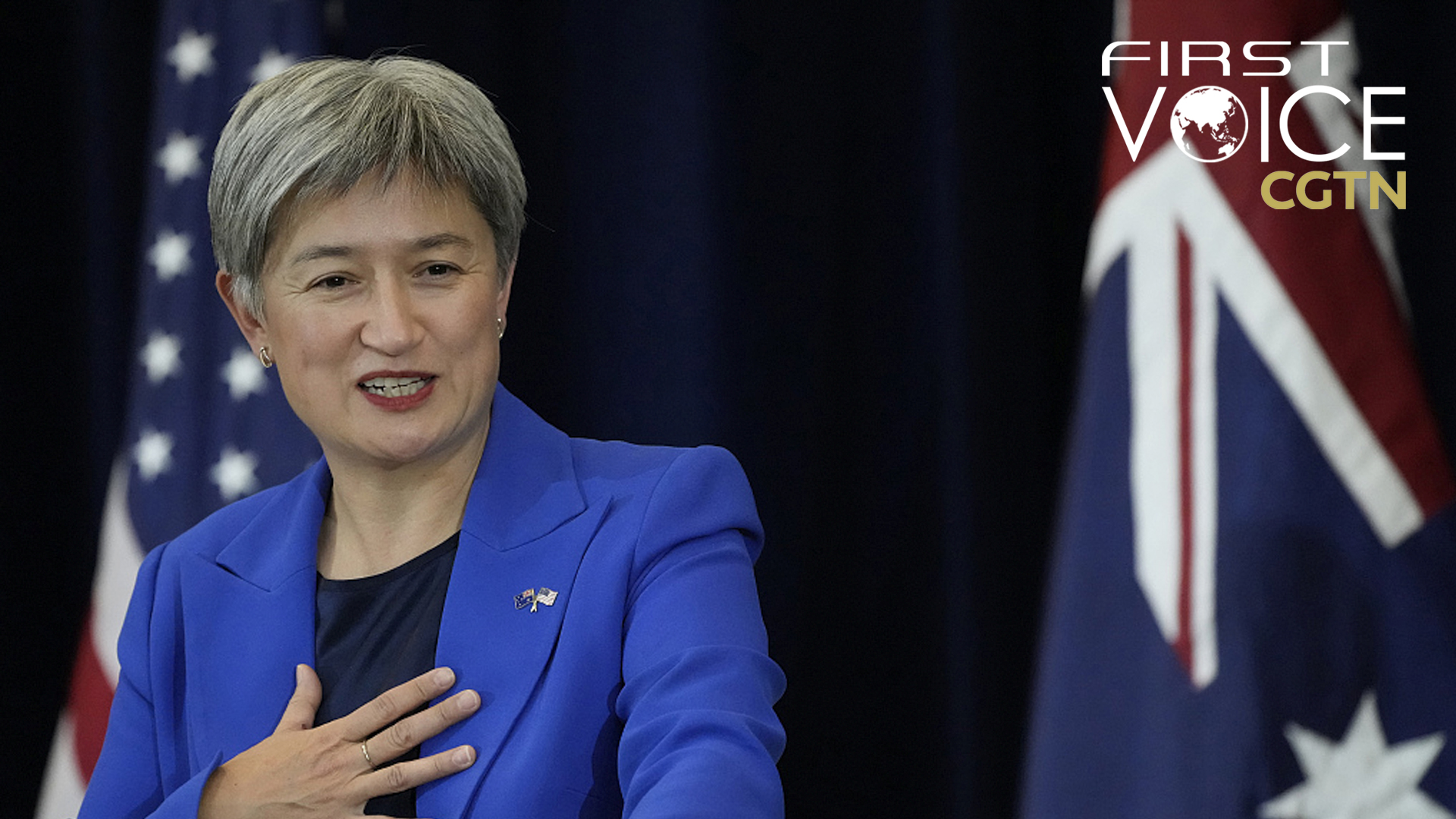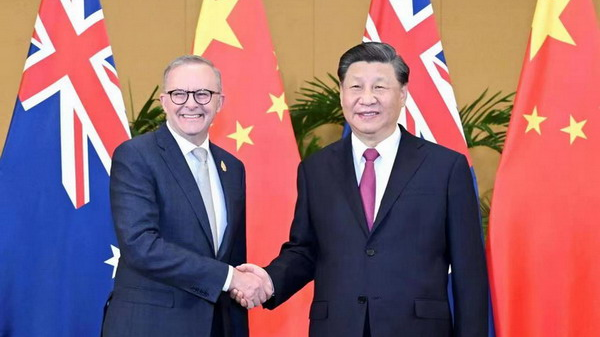
Editor's note: CGTN's First Voice provides instant commentary on breaking stories. The daily column clarifies emerging issues and better defines the news agenda, offering a Chinese perspective on the latest global events.
Australian Foreign Minister Penny Wong arrives in China on Tuesday in signs that Canberra is prepared to mend its ties with Beijing. Wong's visit, the first by an Australian foreign minister since November 2018, coincides with the 50th anniversary of the establishment of diplomatic relations between China and Australia on Wednesday.
The Australian top diplomat will be hosted for talks by Chinese State Councilor and Foreign Minister Wang Yi on Wednesday in the Chinese capital. It is Wong's third meeting with Wang since her Labor Party's election victory last May, following previous meetings in Bali and New York.
Wednesday's meeting would include a new round of China-Australia Diplomatic and Strategic Dialogue, which is viewed as an "ice-breaking" diplomatic event ahead of a possible visit to China next year by Australian Prime Minister Anthony Albanese.
The visit comes following Albanese's meeting with Chinese President Xi Jinping last month on the sidelines of the G20 Summit in Bali, Indonesia, the first bilateral meeting the Chinese leader had with an Australian prime minister in six years. The Bali meeting was also the first sign of the thawing of frosty bilateral relations.
"We hope that Foreign Minister Penny Wong's visit will help both sides to further follow up on the important common understandings reached between our leaders at their meeting in Bali," Chinese Foreign Ministry Spokesperson Mao Ning said on Monday as she briefed reporters on the visit.
Mao said Beijing hoped that the 50th anniversary will provide "an opportunity to reaffirm our commitment to the principle of mutual respect, mutual benefit and seeking common ground while shelving differences, step up dialogue, expand cooperation, manage differences and bring the bilateral relationship back on the right track and realize its sustainable development."

President Xi Jinping held talks with Australian Prime Minister Anthony Albanese on the sidelines of the G20 Summit in Bali, Indonesia, November 15. /China's Ministry of Foreign Affairs
President Xi Jinping held talks with Australian Prime Minister Anthony Albanese on the sidelines of the G20 Summit in Bali, Indonesia, November 15. /China's Ministry of Foreign Affairs
Ahead of her arrival in Beijing, Wong, in a joint statement with Albanese, highlighted the significance of China-Australia trade relations for both sides.
"In 1972, then-prime minister Gough Whitlam took a bold decision, recognizing the importance of engagement and co-operation between our two nations and peoples," the duo said, referring to Whitlam's decision to establish diplomatic relations with China on December 21, 1972.
"In the decades since, China has grown to become one of the world's largest economies and Australia's largest trading partner," they said in the joint statement, adding: "Trade between Australia and China, as well as strong people-to-people, cultural and business links have delivered significant benefits to both our countries."
The positive message coming out of Canberra is laudable and reflects a genuine intention on part of the Albanese-led Labor government to correct the mistakes of the previous Australian administration led by Scott Morrison. Apparently, Canberra wants to bring ties back on track and have pragmatic cooperation with China to deliver concrete benefits to the peoples of the two countries.
This is a welcome change after China-Australia relations experienced a nightmare in the past six years under the administration of Morrison, who brought ties to the brink of collapse through his reckless sabotage. The Morrison government displayed extreme hostility against China and took diktats from Washington as it sacrificed Canberra's own interest and attacked Beijing. As a result, high-level interactions between the two sides dried up during the final years of Morrison's coalition government.
In contrast, Wong's visit has elicited optimism on both sides. Bilateral diplomatic relations stand at a new starting point and the Australian minister's visit offers observers in both countries the much-needed hope of an all-round recovery and improvement in China-Australia relations.
By hosting Wong, China has shown its appreciation for Australia's change in attitude and desire to correct the belligerence of the previous government. Nonetheless, it's still going to be just the first step in bringing back bilateral relations to normalcy.
The recovery of bilateral ties won't be simple, requiring sustained efforts towards building trust and resolving many lingering problems, including those related to trade and economy, and to what extent Canberra can withstand pressure from Washington to pursue an independent foreign policy.
(If you want to contribute and have specific expertise, please contact us at opinions@cgtn.com. Follow @thouse_opinions on Twitter to discover the latest commentaries in the CGTN Opinion Section.)